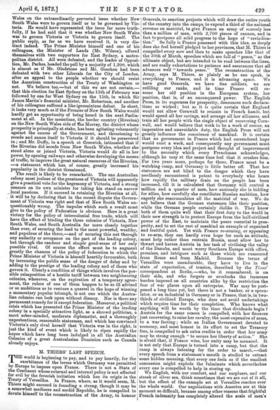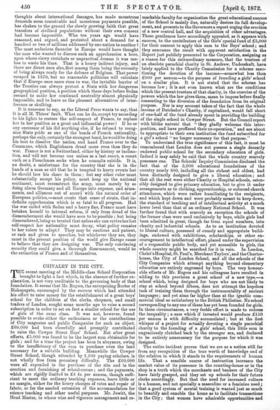M. THIERS' LAST SPEECH.
THE world is beginning to pay, and to pay heavily, for the exorbitance of the terms which Germany was permitted by Europe to impose upon France. There is not a State of the Continent whose external and internal policy is not affected for evil by the feverish irritation which has its origin in the Treaty of Versailles. In France, where, as it would seem, M. Thiers might succeed in founding a strong, though it may be a somewhat mediocre and sordid Republic, he is compelled to devote himself to the reconstruction of the Army, to honour Generals, to sanction projects which will draw the entire youth of the country into the camps, to expend a third of the national revenue on materiel, to give France an army of scarcely less than a million of men, with 2,700 pieces of cannon, and in fact to postpone all solid progress to the hope of " revindica- tion." So fully is France possessed with this idea, so deeply does she feel herself pledged to her provinces, that M. Thiers is compelled every now and then to make speeches like that of the 30th of March, speeches which are full of "peace," as the ultimate object, but are intended to be read between the lines, and are really exhortations to patience and assurances that all advances well "towards peace." The reconstruction of the Army, says M. Thiers, as plainly as he can speak, is everything to France, and it is advancing apace. We have good Generals, we have fine soldiers, we are refilling our ranks, and in time France will re- sume her old position in the European system, her position, that is, of an unconquered power. The English Press, in its eagerness for prosperity, denounces such declara- tions as wicked ; but as it is quite certain that England would not allow Cornwall to remain in French hands, but would spend all her savings, and arrange all her alliances, and train all her people with the single object of recovering Corn- wall, and would believe that work to be a work of rescue, an imperative and unavoidable duty, the English Press will not greatly influence the conscience of mankind. It is certain that no government in France which had surrendered hope would exist a week, and consequently any government must postpone every idea and project and thought of improvement to the necessity which every Frenchman acknowledge; although he may at the same time feel that it crushes him. For two years more, perhaps for three, France must be a watching camp, and Germany is little better off. That her statesmen are not blind to the danger which they have needlessly encountered is patent to everybody who hears how rapidly the military drain on the people has been increased, till it is calculated that Germany will control a million and a quarter of men, how anxiously she is bidding for allies, how carefully she conciliates Russian ambition, how eagerly she reaccumulates all the materiel of war. We do not believe that the German statesmen like their position, while the German people certainly dislike it. They know both of them quite well that their first duty to the world in their new strength is to protect Europe from the half-civilized power of the East, to maintain the peace essential to pros- perity, and to set the rest of mankind an example of organised and fruitful quiet. Yet with France re-arming, or appearing to re-arm, they can hardly even hope for such an attitude, must help rather than restrain Russia, must allow her to- thwart and harass Austria in her task of civilising the valley of the Danube, and must worry Southern Europe with offers, promises, and intrigues such as those which are rumoured from Rome and froth Madrid. Because the terms of Versailles were unendurable, they have to live in the state , of expectation, of tension, described by the Times' correspondent at Berlin,—who, be it remembered, is OD their side, and who forgets or overlooks the immense burden imposed on all countries alike by the restriction the fear of war places upon all enterprise. War may be post- poned a long time yet, but there is not a banker, or a specu.- lator, or an industrial in Germany or in France, that is, in two- thirds of civilised Europe, who does not avoid undertakings which require time for their completion. Who knows what anything will be worth by the time that dividends begin ? Austria for the same reason is compelled, with her finances. just recovering, to raise her cavalry, the most expensive of arms, to a war footing ; while an Italian Government devoted to economy, and most honest in its effort to set the Treasury free, is compelled to ask extra credits in order that her army may be strong enough "to secure her liberty of action." She is afraid that, if France wins, her unity may be menaced. It is not only that Europe is turned into a camp, but that the camp is always listening for the order to march,—that every speech from a statesman's mouth is studied to extract some hidden meaning, that every one feels as if the smallest concussion might explode the fulminate which nevertheless every one is compelled to help in storing up.
We English, with our comfort, and our surpluses, and our streak of silver sea, think sometimes that we are out of it all, but the effect of the example set at Versailles reaches over the whole world. Our negotiations with America are at this moment so difficult, because among other reasons that frightful French indemnity has completely altered the scale of men's
thoughts about international damages, has made monstrous demands seem conceivable and monstrous payments possible, has shaken to the ground the slowly growing faith that great transfers of civilised populations without their own consent had become impossible. Who ten years ago would have reasoned, and argued, and protested about a demand for a hundred or two of millions addressed by one nation to another The most audacious financier in Europe would have thought the man who wanted to discuss such an apprehension a bore, upon whose viewy crotchets or unpractical dreams it was use- less to waste his time. That is a heavy indirect injury, and there are direct ones also, first among them being the necessity of being always ready for the defence of Belgium. That power escaped in 1870, but no reasonable politician will calculate that if Europe once more rises to war, the invisible barrier of the Treaties can always protect a State with her dangerous geographical position, a position which three days before Sedan seemed to make her continued neutrality almost physically impossible, and to leave us the pleasant alternatives of inter- ference or skulking.
It is nonsense to say, as the Liberal Press wants to say, that it is all M. Tillers' fault. What can he do, except try according to his lights to restore the self-respect of France, to replace her in her position as a great and influential power? If he or any successor of his did anything else, if he refused to recog- nize State pride as one of the bonds of French nationality, perhaps the only, certainly the strongest bond, he would be doing his best to dissolve the nation, and hand France over to the Commune, which Englishmen dread more even than they do war. France is not a Switzerland, either by history or inclina- tion, and will not become one unless as a last resort, a resort such as a Frenchman seeks when he commits suicide. It is, no doubt, a misfortune for the country that she is in the hands of a man so old that he is tempted to hurry events lest he should lose his share in them ; but any other ruler must substantially accept his policy, must keep up the national sentiment, must reconstruct the army, must merely by so doing alarm Germany and all Europe into expense, and arma- ments, and alliances out of accord with the natural order of European politics,—must create that sense of strain, that in- definite apprehension which is so fatal to all progress. Had the war ended with Sedan and a heavy fine, France must have betaken herself to internal reform, if only from dread of the dismemberment she would have seen to be possible ; but being dismembered, being so treated that unless she can revive herlost self-respect her nationality must decay, what policy remains to her rulers to adopt ? They may be cautious and patient, or rash and given to speeches, but whichever they are, they must in the present position of the world give Europe cause to believe that they- are designing war. The only convincing security they could give, a thorough disarmament, would be the extinction of France and of themselves.



































 Previous page
Previous page